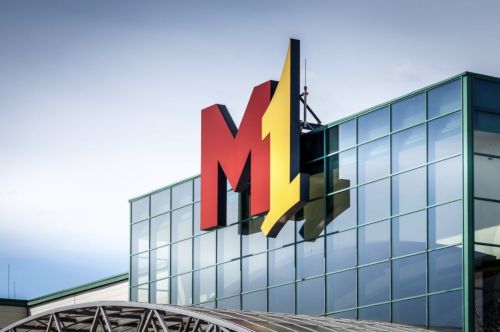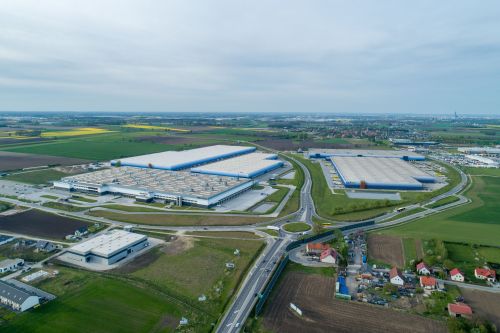All for a good cause
Human resourcesWhat is it that induces us to hand over our hard-earned cash to strangers? What makes some of us sacrifice our valuable time to help the needy? Is it that we feel better about ourselves, safe in the knowledge that we are really deep down good people after all, or is it that we feel genuinely torn when we see suffering? If it's difficult to say why ordinary people support charitable causes, then supposedly cold and heartless companies and corporations doing it can seem even more surprising.
But examples of such generosity abound throughout the real estate industry. MGPA supports SOS Children's Villages and every year allows runners to race to the top of its Rondo 1 building in Warsaw in the 'Rondo 1 Run-up'; Murapol takes part in the Szlachetna Paczka [Noble Parcel] programme, whereby presents are given to the most needy people and families; Dolcan supports the Dzieci Ulicy [Children of the Street] foundation - and even local developers are not averse to giving. Szczecin-based Neptun Developer helps local hospitals and seriously ill children as well as supporting the local opera, while Łódź-based Virako publishes an annual calendar with pictures by renowned photographers. All the proceeds from the auctions of the original photos and the sales of the calendars themselves go towards supporting community centres for underprivileged children. "These are places where the volunteers are young people. They look after children, first of all teaching them how to live independently in the adult world. These centres often become a second, better home for such children. Sadly, every year these community centres face a 'to be or not to be' dilemma. A chronic shortage of money has endangered the existence of these institutions," explains Barbara Otto, assistant to the chairman of the board of Virako. Last year PLN 40,000 was donated to two Łódź youth clubs.
Charity or marketing?
Cynics might say that such campaigns are just one big PR exercise. It's well known that one of the quickest ways to improve your image is to give to charity, but this does not always work, according to Mirella Panek-Owsiańska president of the Responsible Business Forum: "The prospect of improving a corporate image through organising isolated events is very tempting. Nonetheless, one should not underestimate the increasing awareness of our society, which rejects messages that do not seem credible," she explains, and she is even more sceptical of using charity as a tool for crisis management: "Sometimes, a company that experiences a crisis suddenly embarks on philanthropy. While this might work as a way of fixing its image in the short term, in the era of increasing consumer awareness coupled with the widespread use of social media, unethical behaviour can be quickly exposed. Once this happens, one-off charity events or marketing stunts cannot restore the image of the company."
Swedish international construction company Skanska takes CSR most seriously indeed - they understand that they build for people, so they try to take care of them. "CSR goes one step beyond charities," claims Devin Saylor, the sustainability director of Skanska Commercial Development Europe, explaining that charities tend to support specific groups of people, whereas CSR benefits the entire community. "At Skanska we translate CSR into community involvement, because we know that our building business directly influences societies." Furthermore, Skanska supports different organisations with their competence in building, safety and green issues, including, for example, ?Earth Hour', organised by the World Wildlife Fund, where everybody for one day in March is urged to switch off the lights for an hour to raise awareness of sustainability issues. This year, for Earth Hour Skanska went one step further and together with DTZ, Jones Lang LaSalle, Knight Frank and Stena Recycling, challenged Warsaw's office building users to donate their electronic waste. A total of 9,000 kg of waste, such as broken computers and old mobile phones, was collected, enough to fill one refuse truck. When dumped in landfill sites, such waste contaminates ground water, but it also contains valuable metals that can be recycled and sold instead. "We provided people with a place to recycle such waste. In addition it also generated a profit for the WWF and cost us almost nothing, apart from our engagement in it," explains Devin Saylor. She also hopes to expand the challenge to other CEE countries next year.
Agencies are nice too
Other events in Poland in which DTZ has participated include the 3rd Real Estate Beach Volleyball contest organised by Jones Lang LaSalle, the Rat Race (an annual run by people dressed in their work clothes to raise money for the Sue Ryder foundation), and it also took part in the Szlachetna Paczka initiative. But again DTZ stresses its corporate and social responsibility activities: "DTZ has a clear and definite commitment to acting responsibly in business across the world. The focus is on driving and developing sustainable business," claims Ada Taraszewska, the head of marketing and PR at DTZ. She goes on to say that "DTZ recognises that there are ethical and sound business reasons for understanding and managing CR issues. As a leading international professional services firm, the most significant contribution we can make is through the quality of advice that we provide to our clients. We are committed to building our own competences in CR-related areas with our clients, our employees, our suppliers and the wider community in which we live and operate."
When it comes to the charity work of the various real estate consultancies, it occasionally seems that they are all trying to outdo each other in the same way as they compete in their more usual daily business activities. As was mentioned previously, Jones Lang LaSalle organised the 3rd Real Estate Beach Volleyball contest, which raised over PLN 100,000 for a number of charities (an achievement for which they were awarded the Non-Business Achievement Award at the Eurobuild Awards 2012). Again CSR is a major component of the company's activities: "Jones Lang LaSalle strongly believes that it is accountable for the social, environmental and economic impacts of its operations. That is why we are committed to developing policies and services that drive positive changes in the real estate industry. We believe that applying CSR strategies is also about modern, efficient and strategic management and helps in building strong, transparent relations based on mutual trust and understanding with our business partners and employees," says Joanna Gajewska-Sokołowska, the CEE chief operating officer at Jones Lang LaSalle.
CBRE is also very much involved in charity work. In November last year the Warsaw office took part in 'Movember' (all the men grew moustaches to raise money and awareness for men's health topics). In Budapest on December 6th, everyone dressed up as Father Christmas and then went out to clear the graffiti off the Lánchíd bridge; and in April this year CBRE sent a delegation to Madagascar to help the charity UNICEF build schools. "The Madagascar trip was a very moving, overwhelming and inspiring experience for me. In the villages where we built cyclone-proof schools I met hundreds of children and their parents, who were so thankful that we were changing their lives for better," says Aneta Mandziuk, the senior marketing and communication manager at CBRE.
One day a year
Colliers is equally involved in helping local communities. On September 21st last year. employees of the consultancy spent the day away from their desks helping local communities. In the CEE region, CBRE branches in thirteen countries took part. A total of USD 4,000 was raised in cash, while other donations (such as tools and equipment) were made worth around USD 3,600. A total of 230 people took part to the benefit of 15 charities.
International warehouse developer Prologis has also taken a similar approach to helping communities, with its 'Impact Day' campaign, which took place on May 17th. "I was genuinely touched by our teams' commitment to supporting our local communities. We made a real difference to the lives of the people we supported. Sometimes you just have to donate your time and engagement and it's enough to see the changes," says Ben Bannatyne, the managing director and regional head of Prologis in the CEE region. In Poland, Prologis has helped to clean a mini zoo in Helenów as well as paint the animal houses and mend the fences. The TPD Helenów Centre for Rehabilitation, Education and Welfare works with children who have physical and learning disabilities, providing education, rehabilitation and care. But Ben Bannatyne stresses that this is only a small part of the company's activities: "The company's commitment to corporate social responsibility extends beyond Impact Day. Prologis provides employees with three additional days of paid time off each year to volunteer for non-profit organisations: two days for company-sponsored organisations and one day for the non-profit of the employee's choice," he explains.
Surprising or not, it appears that being good has become an integral part of modern day business with ever more firms devoting company time to volunteering. Perhaps the best explanation is provided by Mirella Panek-Owsiańska, when she says, "The positive impact of corporate social responsibility, its ethical aspect included, should be assessed in the long run. CSR as a policy appears convincing to investors who want to develop cooperation with relevant companies - a recent trend known as 'socially responsible investing'."





















































